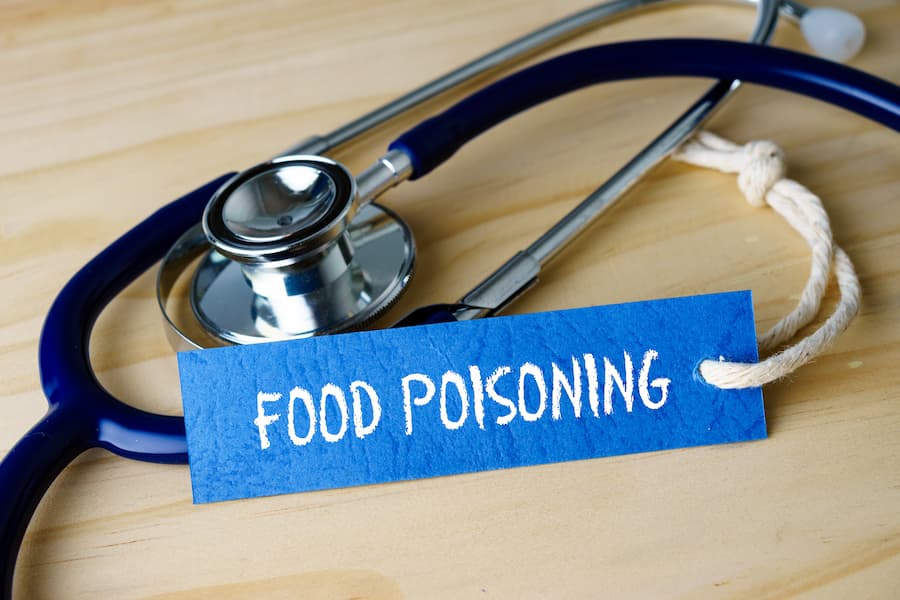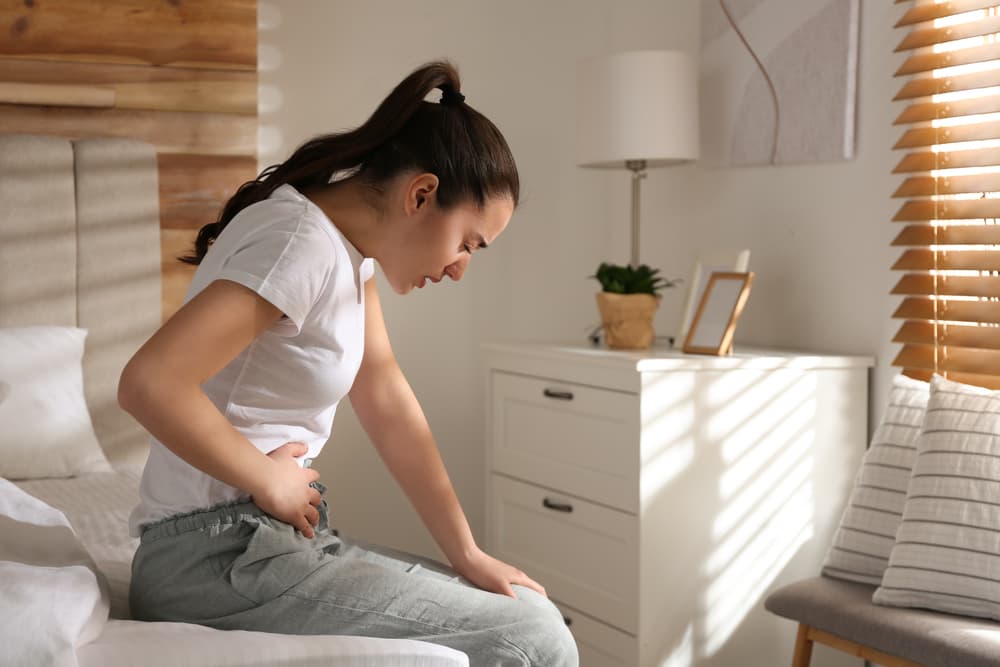Food poisoning happens when you ingest food and beverages contaminated with bacteria, viruses, parasites, or toxins. The contamination could occur any time during harvesting, processing, or storage. Finally, the food servers and cooks handling your food could contaminate it during preparation.
You may ask yourself, if you suffered from food poisoning due to someone else’s conduct, can you sue those liable? This post will help answer that question and give guidance on steps to take after a food poisoning case.
Types of Food Poisoning
More than 250 types of foodborne illnesses exist. However, most people only know a few. Some of the more common types of foodborne illnesses include:
E. Coli
Most people have E. coli in their intestines—but these are not the strains you must worry about. Strains of E. coli called “Shiga toxin-producing E. coli” or STEC can be very harmful to humans. While E. coli is most commonly associated with ruminant animals like cattle, produce can become contaminated with feces through runoff from nearby farms, use of manure as a fertilizer, or irrigation with contaminated water. You could also get sick from E. coli by eating food that hasn’t gone through the proper cooking process, not washing your hands after using the bathroom or touching an animal, or person-to-person contact.
Symptoms of E. coli include diarrhea, severe stomach cramps, and vomiting. The hallmark sign of STEC is bloody diarrhea. STEC can cause hemolytic uremic syndrome (HUS), which can lead to permanent kidney damage or even death.
Salmonella Poisoning
Salmonella food poisoning is common in raw eggs and undercooked poultry, but can contaminated a wide-variety of products, including produce and otherwise shelf-stable foods like peanut butter. The bacteria thrive in warmer temperatures, which is why Salmonella poisoning is more frequent in the warmer months.
Symptoms include diarrhea, stomach cramps, fever, and vomiting. Symptoms could start as early as six hours and last as long as six days after consuming tainted food. Most Salmonella cases last from four to seven days, but infections can be severe and require hospitalization. Some sufferers of acute Salmonella infections may develop Guillain Barre syndrome, a neurological disorder; reactive arthritis; or post-infectious IBS.
Clostridium Perfringens
Leaving meat and poultry unrefrigerated for too long could cause Clostridium perfringens. Symptoms include stomach cramps and diarrhea and generally last fewer than 24 hours.
Listeriosis
The Listeria bacteria causes listeriosis, which could affect anyone, but it mostly affects pregnant women, people over 65 years of age, and newborns. It also affects those with a weakened immune system. This germ can survive in refrigerated temperatures. Generally, you can find it in produce and dairy products.
In healthy individuals, listeriosis symptoms are typically mild. However, compromised individuals can develop Listeria meningitis. Symptoms include confusion, headaches, fever, neck stiffness, and muscle aches which start one to four weeks after exposure. The symptoms generally last from one to three days. Antibiotics can treat listeriosis.
Cyclospora
While many cases of food poisoning are caused by bacteria, Cyclospora cayatenensis is caused by a protozoan parasite. Food can become contaminated with Cyclospora if it comes into contact with human feces, either by contaminated water or direct contact. After contaminating the food item, most often produce, the organism must sporulate over the next several days to be infectious. Once Cyclospora contaminates a food item, it is very difficult to remove or kill.
Symptoms of cyclosporiasis include profuse watery diarrhea, nausea, low grade fever, headache, and abdominal pain. Cyclospora infections often ebb and flow, becoming milder and then getting worse if not treated.
The Importance of Seeing a Doctor When You Suspect Food Poisoning

Your doctor creates a personal and medical history regarding a food poisoning case. They include your symptoms and all the food you ate. They might order a blood test or stool culture and complete a comprehensive medical exam.
The tests can also help you establish a product liability case as it provides documentation of food poisoning. If you test positive for certain foodborne illnesses, the healthcare provider also notifies the local health department of the type of food poisoning you have.
After an illness is reported by a provider, the health department will conduct an interview and test any isolate of the bacteria that caused a person’s illness using Whole Genome Sequencing (WGS). Using this information, epidemiologists look for a food poisoning outbreak in your town, county, or state. If the health department identifies a food poisoning upsurge, the health department compares medical records to find a common denominator across patients. They usually then take action, including notifying the food manufacturer or distributor and warning the public.
If the health department finds that your food poisoning is related to others but hasn’t declared an outbreak, your case might be the one that determines an outbreak. If others suffer the same type of food poisoning after eating one of the same foods you ate, the health department will notify you of an outbreak. Either way, documentation from the health department gives you more evidence that you can use in a claim for losses caused by food poisoning.
Proving a Food Poisoning Claim
Proving a food poisoning claim is tough—but not impossible, especially with an experienced food poisoning lawyer.
Documentation from your doctor and the health department makes proving your claim easier. You should always contact a product liability attorney if you suspect food poisoning or if your doctor diagnoses you with food poisoning.
Because most cases of food poisoning don’t exhibit symptoms until days later, the food is usually long gone. Thus, unless you have a diagnosis, most of the evidence is circumstantial. Food manufacturers, distributors, and retailers will do anything possible to eliminate liability for food poisoning.
To prove a food poisoning claim, you need a lawyer who can show that you ingested spoiled food that made you sick, and the source of that food. (You needn’t show that the defendant negligently handled the food, though doing so can strengthen your case.)
See a doctor as soon as you start exhibiting food poisoning symptoms. It is easier to win a food poisoning claim if the Food and Drug Administration or the Department of Health in your state links your food poisoning to an outbreak.
When lawyers work on food poisoning cases, they can provide evidence to bolster your case, including:
- Similar food poisoning cases from the same source. For example, if you bought a package of sprouts from ABC Grocery and they made you and others sick, the health department will have records of others who went to the doctor.
- Evidence connecting the food poisoning to the food provider. For example, the health department visits a food manufacturer or distributor and finds evidence of the type of food poisoning you suffered in the factory, such as a strain of salmonella in a peanut factory or E. coli in a produce distributor.
- Medical records documenting the food you ate and the type of food poisoning you suffered.
When you suspect food poisoning, whether it is from food you purchased from a grocery store or ate in a restaurant, see a doctor immediately and contact a product liability attorney.
While you may take all necessary precautions while handling food at home, the bacteria, viruses, or germs already in the food can still make you sick. For example, most people don’t refrigerate or cook peanut butter, so you may eat contaminated peanut butter and suffer food poisoning without any mishandling on your end.
Other foods that more frequently cause food poisoning include pastries, deli meats, jams and jellies, and even bottled water.
Recovering Damages After a Food Poisoning Case
While some food poisoning cases cause extreme discomfort for a few days, others could cause catastrophic injuries or even death. The damages you recover after a food poisoning case depend on several factors, including how sick you were, if the ailment lasts longer than expected, if it causes internal organ or brain injuries, or if a loved one dies from the illness.
You could recover compensatory damages in the form of economic damages and non-economic damages after experiencing food poisoning. Compensatory damages seek to make you financially whole again. While they don’t bring back a loved one or eliminate long-term or permanent disabilities caused by food poisoning, they can significantly reduce the financial stress you suffer by not being able to work or by losing part of your household income should you lose a loved one.
Compensatory damages have two forms:
Economic Damages
Sometimes referred to as special damages, economic damages have a monetary value. Most people injured due to another’s negligence, including food poisoning, can recover economic damages, including:
Medical Expenses
If you suffer from food poisoning, you could have some medical costs.
However, if the foodborne pathogen causes serious disorders or death, you could have a myriad of medical charges, including:
- Doctors’ appointments
- Prescriptions and prescribed over-the-counter medications
- Ambulatory aids
- Surgeries and follow-up appointments
- Home health care
- Nursing home or rehabilitative home care
If the foodborne malady causes traumatic brain injuries or other catastrophic injuries, you could also require updates for hand controls in your vehicle and updates to your home. Some examples of these updates are wheelchair ramps, handrails, grab bars, and widened doorways to improve accessibility.
Loss of Earnings and Earning Capacity
Should the foodborne affliction keep you out of work, you could recover the income you lost for the days you were out. If the foodborne contagion caused a severe or catastrophic illness that led to long-term or permanent disabilities, you could recover loss of earning capacity until your expected retirement date.
Even if you can work part-time or take work full-time, but at a position that doesn’t pay what you made before the sickness, you could still recover the loss of partial earning capacity until your retirement date.
Death-Related Fees
If a foodborne disease takes the life of a loved one, you may have a wrongful death claim. Additionally, you could recover funeral and burial payments, cremation expenses, particular probate court fees, and probate attorneys’ fees and costs.
Non-Economic Damages
Sometimes referred to as general damages, non-economic damages do not have a set monetary value. Only some people injured due to another’s negligence, including food poisoning, can recover non-economic damages.

Generally, you must have suffered long-term or permanent disabilities caused by your injuries or ailment, or you must have lost a loved one to recover non-economic damages, including:
- Pain and suffering, including emotional distress.
- Loss of quality of life if you have to make lifelong changes such as taking prescription drugs or using ambulatory aids.
- Loss of use of a body part or bodily function. This might transpire if the foodborne malady causes a brain injury.
- Loss of companionship if your affliction or the disease it caused prevents you from enjoying family activities and events or participating in your family’s daily activities.
- Loss of consortium if the infection or disease it caused prevents you from enjoying a physical relationship with your spouse.
- Inconvenience if you have to hire someone to do the chores you usually do, including but not limited to house cleaning, grocery shopping, cooking, lawn maintenance, and home repair and maintenance.
While the money doesn’t remove the pain and suffering or bring back a loved one, it significantly decreases the financial stress caused by not working or losing a loved one. If you suspect you have food poisoning or lost a loved one to a foodborne contagion, contact an experienced product liability attorney as soon as possible for a free case evaluation to learn about your right to compensation for your losses.
